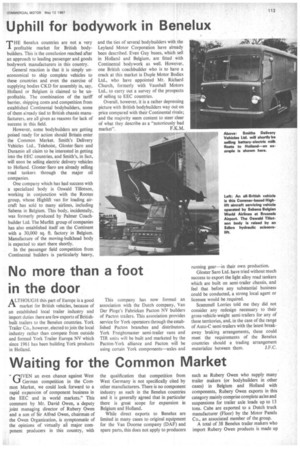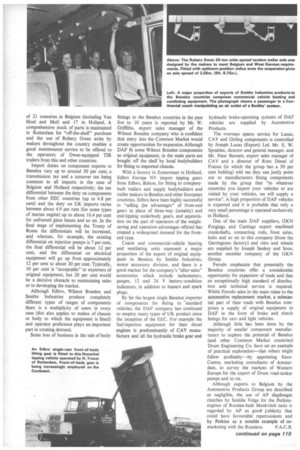Waiting for the Common Market
Page 115

Page 116

If you've noticed an error in this article please click here to report it so we can fix it.
" r 'SVEN an even chance against West V German competition in the Common Market, we could look forward to a rapid expansion of component business in the EEC and in world markets." This comment by Mr. David Owen, a deputy joint managing director of Rubery Owen and a son of Sir Alfred Owen, chairman of the Owen Organization, is symptomatic of the opinions of virtually all major component producers in this country, with the qualification that competition from West Germany is not specifically cited by other manufacturers. There is no component industry as such in the Benelux countries and it is generally agreed that in particular there is great scope for expansion in Belgium and Holland.
While direct exports to Benelux are limited in many cases to original equipment for the Van Doorne company (DAF) and spare parts, this does not apply to producers such as Rubery Owen who supply many trailer makers (or bodybuilders in other cases) in Belgium and Holland with components, Rubery Owen exports in this category mainly comprise complete axles and suspensions for trailer axle loads up to 13 tons. Cabs are exported to a Dutch truck manufacturer (Floor) by the Motor Panels Co., an associated member of the group.
A total of 38 Benelux trailer makers who import Rubery Owen products is made up of 21 concerns in Belgium (including Van Hoot and Mol) and 17 in Holland. A comprehensive stock of parts is maintained in Rotterdam for "off-the-shelf" purchase and the use of Rubery Owen axles by makers throughout the country enables a good maintenance service to be offered to the operators of Owen-equipped TIR trailers from this and other countries.
Import duties on component exports to Benelux vary up to around 30 per cent, a transmission tax and a turnover tax being common to all imports in the case of Belgium and Holland respectively; the tax differential between the duty on components from other EEC countries (up to 4.8 per cent) and the duty on UK imports varies between about 4.9 per cent (for some types of marine engine) up to about 16.4 per cent for unframed glass lenses and so on. In the final stage of implementing the Treaty of Rome the differentials will be increased, and whereas, for example, the existing differential on injection pumps is 7 per cent, the final differential will be about 12 per cent, and the differential on electrical equipment will go up from approximately 12 per cent to about 20 per cent. Typically, 10 per cent is "acceptable" to exporters of original equipment, but 20 per cent would be a decisive obstacle to maintaining sales or to developing the market.
Although Edbro, Wilmot Breeden and Smiths Industries produce completely • different types of ranges of components there is a multiplicity of users in every case (this also applies to makes of chassis or body to which the equipment is fitted) and operator preference plays an important part in creating demand.
Some loss of business in the sale of body fittings to the Benelux countries in the past five to 10 years is reported by Mr. W. Griffiths, export sales manager of the Wilmot Breeden company who is confident that entry into the Common Market would create opportunities for expansion. Although DAF ,fit some Wilmot Breeden components as original equipment, in the main parts are bought off the shelf by local bodybuilders for fitting to imported chassis.
With a factory in Zoetermeer in Holland, Edbro Europa NV import tipping gears from Edbro, Bolton, for fitting to companybuilt trailers and supply bodybuilders and trailer makers in Benelux and other European countries. Edbro have been highly successful in "selling the advantages" of front-end gears in place of three-way (notably) and end-tipping underbody gears, and appreciation on the part of operators of the weightsaving and operation advantages offered has created a widespread demand for the frontend type.
Coach and commercial-vehicle heating and ventilating units represent a major proportion of the export of original equipment to Benelux by Smiths Industries, motor accessory division, and there is a good market for the company's "after-sales" accessories which include tachometers, gauges, 12 and 24 V battery-condition indicators, in addition to heaters and spark plugs.
By far the largest single Benelux importer of components for fitting to "standard vehicles, the DAF company has continued to employ many types of UK product since the inception of the EEC. For example the fuel-injection equipment for their diesel engines is predominantly of CAV manufacture and all the hydraulic brake gear and hydraulic brake-operating systems of DAF vehicles are supplied by Automotive Products.
The overseas spares service for Lucas, CAV and Girling components is controlled by Joseph Lucas (Export) Ltd. Mr. E. W. Spraklen, director and general manager, and Mr. Peter Bennett, export sales manager of CAV and a director of Rota Diesel of France (in which the group has a 50 per cent holding) told me they can justly point out to manufacturers fitting components made by the group that "to whatever countries you 'export your vehicles or are visited by your vehicles, we will supply a service". A high proportion of DAF vehicles is exported and it is probable that only a very small percentage is operated exclusively in Holland.
One of the main DAF suppliers, GKN Forgings and Castings export machined crankshafts, connecting rods, front axles, hubs and so on to this company (from the Garringtons factory) and rims and wheels are supplied by Joseph Sankey and Sons, another member company of the GKN Group.
Ferodo emphasize that potentially the Benelux countries offer a considerable opportunity for expansion of trade and that an exceptionally high standard of distribution and technical service is required. Whilst Ferodo sales in the main relate to the automotive replacement market, a substantial part of their trade with Benelux comprises a supply of original equipment to DAF in the form of brake and clutch linings for cars and light vehicles.
Although little has been done by the majority of smaller component manufacturers to explore the potential of Benelux (and other Common Market countries) Drum Engineering Co. have set an example of practical exploration—that others might follow profitably—by appointing EuroCentre, marketing consultants of Amsterdam, to survey the markets of Western Europe for the export of Drum road-tanker pumps and so on.
Although exports to Belgium by the Automotive Products Group are described as negligible, the use of AP diaphragm clutches by Scaldia Volga for the Perkinsengines of Russian-built Moskvitch taxis is regarded by AP as good publicity that could have favourable repercussions and by Perkins as a notable example of co
marketing with the Russians. P.A.C.B.
















































































































































































































































